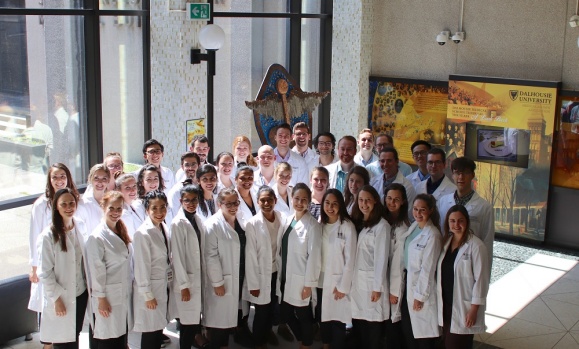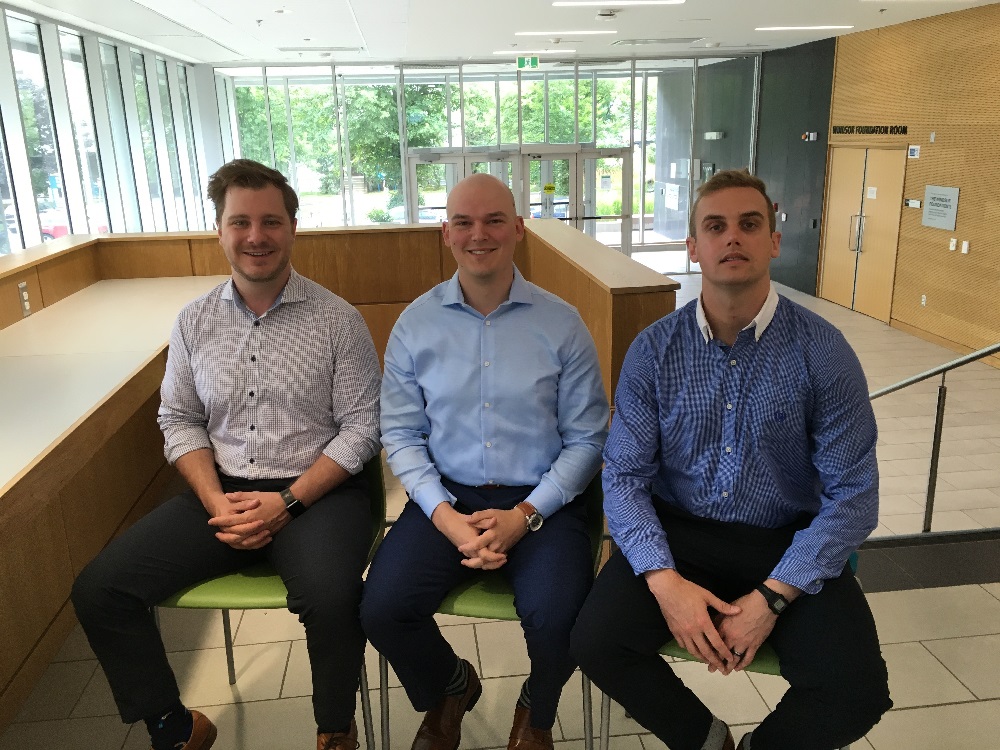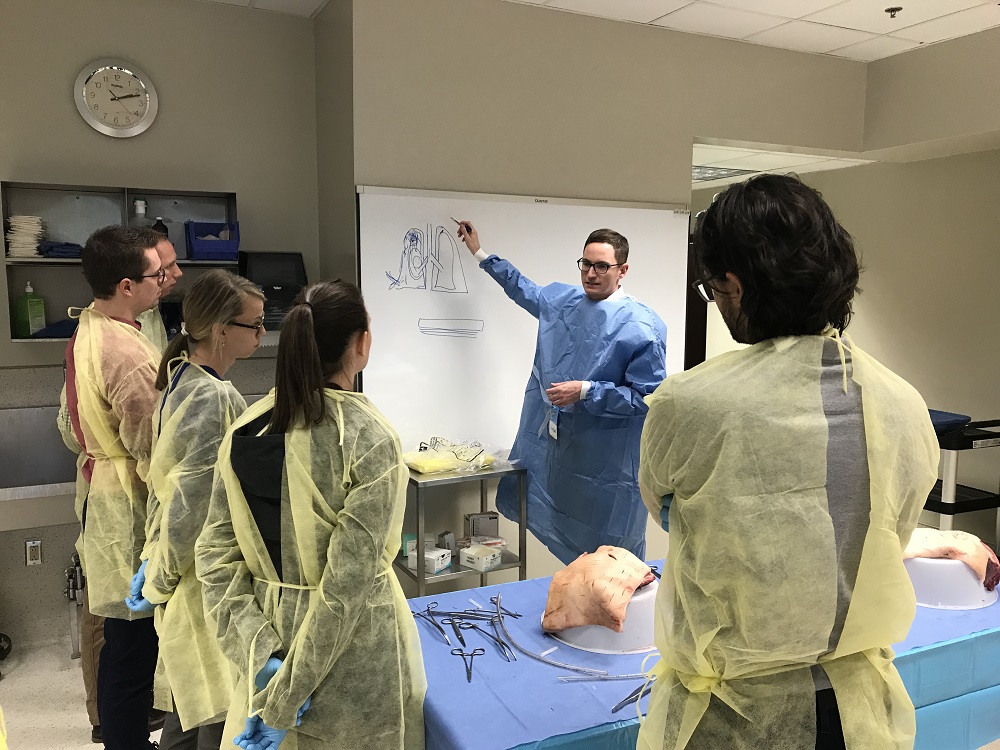News
» Go to news mainStudent‑run program showcases careers in different medical specialties

Variety may be the spice of life, but for future doctors, the number of possible career paths available to them can be overwhelming, especially with key decisions on residency programs often having to be made before their clerkship is completed.
This conundrum led medical student Todd Dow to brainstorm the idea for the Pre-clerkship Residency Exploration Program (PREP), a two-week-long elective for second-year medical students that was held for the first time this spring.
PREP features workshops, lunchtime seminars, specialty electives, simulations and skills sessions that expose students to day-to-day life in 14 different medical specialties. The program’s goal is to allow participants to make more informed career decisions, while reducing some of the anxieties associated with moving into clerkship.
“It’s a scary thing when you consider that you might have two or three real exposure opportunities to a specialty of your choice (through electives) during the first two years of medical school; there are a vast number of specialities to choose from,” Dow says.
In Dow’s first year of med school in 2016-17, he served as the Junior Director of the Surgical Exploration and Discovery (SEAD) program, a student-run initiative for students wishing to explore surgical specialties in greater depth.
After participating in SEAD, Dow and classmate Sebastian Haupt realized they had a better understanding of the life of a surgeon, but still lacked knowledge of careers in other areas of medicine.
This sparked the idea for a student-run program to shine a light on other medical specialties, specifically those that are underexposed, with Haupt and Mike Smyth joining Dow as self-appointed Senior Directors.
“We got in touch with the people who brought the SEAD program to Dalhousie in order to develop a better idea of the steps they had to take to establish the program,” Dow says. “We learned a lot from those meetings and realized the importance of identifying staff physicians in each department to act as ‘champions’ of the program.”
Dr. David Bowes, associate professor in the Department of Radiation Oncology, Student Affairs Career Advisor and faculty leader for the Radiation Oncology component of PREP, welcomed the program, which he says fills a need.
“Medical students often have to make decisions about what they want to do before they’ve rotated through everything – they find out what discipline they’ll be going into late in their fourth year,” he says. “They can end up going down a path to a particular specialty without knowing what their other options are.”
A team effort
To support the program, the trio identified faculty champions from seven different medical departments, as well as personnel from Student Affairs, Undergraduate Medical Education, the Collaborative Health and Education Building and the QEII Health Sciences Centre. Dow estimates that over 150 people were involved in some way with PREP.
“The tremendous amount of support we received for the program from every department and office involved was astounding,” he says. “Faculty, staff and administration put in countless hours to help the student participants. It’s no small task to accommodate 40 student-learners, so we cannot thank those involved enough.”
Program structure
PREP took place over two weeks from May 28 – June 8, 2018, time that second-year students would normally have had free. The 10 days of programming included elective slots in various specialities, workshops, skills sessions, simulations and discussions with residents and faculty members centered around careers in various medical specialties.
Space limitations in medical facilities meant that not everyone who wanted to participate could; 74 of 110 second-year students, including those from Dalhousie Medicine New Brunswick, applied for the program, and 40 were selected via a randomized lottery held by the Student Affairs office.
Smyth notes that funding was provided by DMNB through its annual giving campaign in order to help the New Brunswick students with living expenses during their stay in Halifax.
Haupt described the two weeks as “a great experience.”
“It’s hard to make a judgment on a specialty after a half-day session, but it can give you a sense of if it’s something you want to do,” he says.
Dow noted that simply becoming more familiar with the buildings that comprise the QEII Health Sciences Centre was beneficial to him.
“One of the biggest things that made me a lot more comfortable with moving forward in my medical training was just knowing where things are,” he says. “PREP provided me the opportunity to rotate through many of the departments within the QEII and if you’re on call or on a rotation and you need to go to a department, the familiarity is nice.”
 (L to R): PREP Senior Directors Mike Smyth, Todd Dow and Sebastian Haupt
(L to R): PREP Senior Directors Mike Smyth, Todd Dow and Sebastian Haupt
"A huge success"
Dr. Thomas Arnason, the longitudinal theme head for pathology in the medical school curriculum, was the faculty leader for the pathology component of PREP. He considers himself a “major advocate” for the program.
“There is no third-year core clerkship rotation in pathology,” he says. “Consequently, I worry that medical students lack the opportunity to see what the day-to-day job of a pathologist is like at the hospital. There could be missed opportunities where students who might consider a career in pathology and lab medicine lack the early exposure to the specialty that would influence their residency and career decisions.”
PREP participants spent a half-day with pathologists doing their regular clinical work and another half-day in a pathology workshop.
Arnason describes the first year of PREP as a “huge success.”
“Faculty in pathology really enjoyed working with the medical students and having the opportunity to help them discover our specialty,” he says. “The student leads are incredibly well organized. We received a detailed program evaluation specific to pathology and I was happy to see that 95 per cent of participating students recommended keeping both our Hematopathology and Anatomical Pathology workshops in future years.”
Evaluating first-year success
As noted by Dr. Arnason, each subject area received a thorough report on its effectiveness. Participants were also asked to complete pre- and post-program surveys on their attitudes toward careers in a particular specialty; ophthalmology saw the biggest jump in popularity.
Following completion of the program, 92 per cent of survey respondents said that PREP increased their confidence and comfort level heading into clerkship, and all respondents said they’d recommend a second-year student apply to the program.
“People have reported that they’ve found potential elective preceptors, made connections, figured out a little more direction to their future career path,” says Tom Toguri, a Junior Director who helped produce end-of-program reports.
 Dr. Andrew Fagan leads a group of PREP participants during one of the program's skills circuits
Dr. Andrew Fagan leads a group of PREP participants during one of the program's skills circuits
Building for the future
Dow, Smyth and Haupt are all entering their third year of medical school this fall, but the foundation has been laid to keep PREP running long after they’ve graduated.
In December 2017, the trio appointed Med 1 students Toguri, Alysha Roberts and Kavitha Raju to serve as Junior Directors. Those students provided behind-the-scenes support in the program’s inaugural year, and are ready to step into Senior Director positions this fall as they enter their second year of classes.
Both sets of directors would like to see PREP be adopted by different medical schools, similar to how the SEAD program made its way from the University of Toronto to Dalhousie and other institutions.
“It would be nice to allow students from other schools to have a similar experience,” Smyth says. “The difficulty is identifying schools that have that second summer off.”
Raju praised the work of Dow, Smyth and Haupt in getting PREP off the ground, and looks forward to the future.
“I don’t think anyone could run this program as well as Todd did,” she says. “I’m grateful to Todd, Mike and Sebastian for taking the time to create this amazing program and I hope years of future medical students will be able to benefit from it.”
“We’ve formed great relationships with a number of departments,” Roberts says. “I’m confident we’ll be able to grow those partnerships further and offer a great opportunity for more students to explore careers in different fields of medicine."
Recent News
- New global study Highlights the Biological Roots of Anxiety
- Dalhousie and NCIME launch first‑of‑its‑kind program in Membertou First Nation
- A message from Wanda M. Costen, PhD, Provost and Vice President Academic
- Rhodes scholar Sierra Sparks returns home to study medicine
- President Kim Brooks, Dr. Pat Croskerry appointed to Order of Canada
- Dal’s Highly Cited Researchers reflect on influential global research alliances
- A New Bursary Supporting Black Medical Students at Dalhousie
- Dalhousie’s first physician assistant cohort steps into Nova Scotia’s healthcare system
